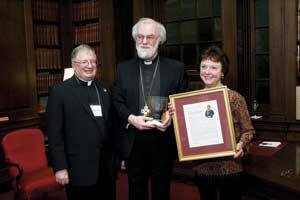Introducing him as a “prophet to a post-Christian age,” Drew Christiansen, S.J., editor in chief of America, welcomed Rowan Williams, the archbishop of Canterbury and leader of the worldwide Anglican Communion, as the recipient of the 2009 Campion Award for Achievement in Christian Letters. “As a poet, theologian, apologist, culture critic and translator, the archbishop has heightened readers’ receptivity to transcendence, opened their minds to revelation and diagnosed the spiritual ills that debilitate our...culture,” Father Christiansen said.
Archbishop Williams was honored at a reception on Jan. 25 at America House in New York. The Campion award is named for the 16th-century English Jesuit who boldly defended Catholicism in his writing. He is remembered by both the Roman Catholic Church and the Church of England as one of the 40 martyrs of England and Wales.
Father Christiansen described the Campion award to Archbishop Williams as “an ecumenical event blessed and guided by our martyred forebears, both Anglican and Catholic. It is also a celebration of our common ministry of the word. For in his prolific career as a scholar and writer, Archbishop Williams has shared in the ministry of the word at which St. Edmund Campion excelled and to which the Society of Jesus is committed.”
In accepting the award, Archbishop Williams called the prize “an act of ecumenical generosity and fellowship.” He said “martyrial ecumenism,” the Anglican and Catholic decisions to honor the same martyrs, began an experience of conversion not unlike that of St. Paul when he began to see the face of Jesus in the faces of those he had persecuted. “It has been a deep dimension of Christian holiness to be able to go to one’s brothers and sisters in repentance and receive from those you’ve offended or excluded the grace of God’s welcome,” said Archbishop Williams. “When our churches learn to celebrate fully and gladly each others’ martyrs, as they have begun to do, then that moment of Paul’s conversion comes alive again.”
The archbishop said that Edmund Campion has long had a place among his own interests, recounting an academic theory that a young William Shakespeare spent some time learning the “trade of school-mastering” at the same English nobleman’s home where Campion was a guest. Archbishop Williams mused about the conversations that might have taken place between the young playwright and the Jesuit. “I like to think that the priest on his way to martyrdom may very well have sown a seed there,” he said. “Martyrdom is excessive, extravagant and foolish...[a] profound witness about the depths of human possibility in the face of what can in some circumstances seem like fathomless evil.” It affirms that something is worth dying for, he added; “It is the grace, the love, the infinite compassion of God.”
In a homily during a prayer service afterward to mark the close of the Week of Prayer for Christian Unity, Bishop William F. Murphy of Rockville Centre, N.Y., noted that the cause of ecumenism “has become problematic between our two communities.” Nevertheless, he told Archbishop Williams, “you have never abandoned either your respect for the office you hold or the cause of ecumenism.”
Bishop Murphy continued: “The dignity with which you have upheld your office in all our ecumenical relations is a lesson to us [all]. The fidelity to the word of God which marks your preaching and teaching is a sign of one who with all his heart seeks to be Pauline in inspiration and in word.”
For more coverage of the award, visit americamagazine.org/campion.








